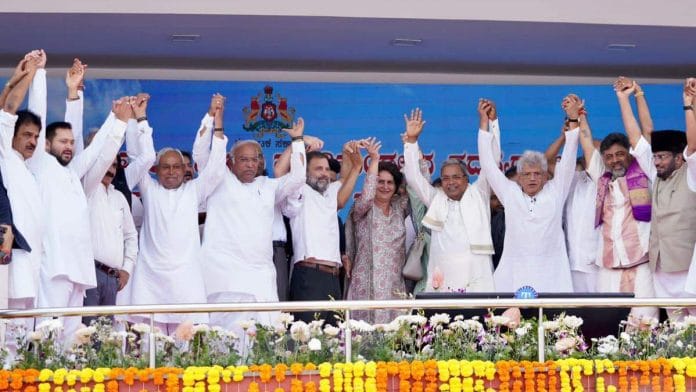New Delhi: With various notes of dissonance emerging ahead of the Opposition’s 23 June gathering in Patna, efforts are under way to identify issues on which a common ground can be reached, ThePrint has learnt. The question on seat-sharing will be left for subsequent meetings in the run-up to 2024 general elections.
The Centre’s ordinance on the matter of “services” in Delhi — alleged by the Union territory’s AAP administration as a bid to clip their wings — is among the subjects on which a consensus eludes the Opposition, especially with the Congress’ hesitation on making its position clear before it is voted upon in Parliament when brought in the form of a bill.
Responding to a question on the ordinance, Congress leader Manish Tewari said Monday, “We will cross the bridge when we get there. Parliament session is still some time off.”
The Congress’ ambivalence stems primarily from the fact that its Delhi and Punjab units are against having any truck with the AAP, which unseated the party from power in both places.
Another Congress leader, on the condition of anonymity, said, “It’s not like we are not ready to support them on the ordinance but they will have to moderate their position. There will be no declaration on 23 June on whether or not we support the ordinance.”
The Government of National Capital Territory of Delhi (GNCTD) (Amendment) Ordinance, 2023, promulgated on 19 May, created a new statutory authority — headed by the Delhi CM and two IAS officers — to decide all matters related to the transfer and posting of civil servants in the national capital by majority of votes.
The ordinance effectively nullified an 11 May Supreme Court judgment giving the Delhi government greater legislative and administrative control over “services”. Soon after the ordinance was promulgated, Delhi Chief Minister and AAP national convener began reaching out to the heads of several Opposition parties to rally support against the ordinance — which will have to be passed by Parliament as an Act to stay in place — in the Rajya Sabha, where the BJP lacks a majority.
Kejriwal has managed to elicit support from most Opposition parties.
He has also sought — but failed so far — to get an appointment with Congress president Mallikarjun Kharge and former MP Rahul Gandhi.
A senior AAP leader, speaking on the condition of anonymity, told ThePrint that they “remain hopeful” that the Congress will oppose the ordinance in Parliament. “We are not considering the fact that Kharge did not meet us as a snub. Given the bad blood between our parties, the Congress’ position is not entirely surprising,” the AAP leader said.
Parties that have assured the AAP that they will vote against the ordinance in the Rajya Sabha include the Trinamool Congress (TMC), Nationalist Congress Party (NCP), Shiv Sena (UBT), Jharkhand Mukti Morcha (JMM), Communist Party of India (Marxist), CPI, Dravida Munnetra Kazhagam (DMK), Rashtriya Janata Dal (RJD), and Janata Dal United (JD-U).
TMC Rajya Sabha MP Derek O’Brien, who is likely to attend the 23 June meeting along with West Bengal Chief Minister and TMC supremo Mamata Banerjee, indicated Monday that most Opposition parties view the debate on the ordinance through the wider lens of Centre-state relations.
“It’s a federal issue. It is not about the AAP or any individual party. There is a broad agreement to defeat the government on the floor of the Rajya Sabha in 2023,” O’Brien said.
Situation in the House
The AAP, including its own 10 MPs, has the support of 106 MPs in the 238-member Upper House.
The BJP-led NDA also has 106 members on its side, but it banks on the support of friendly Opposition parties such as the YSR Congress Party (USRCP), Biju Janata Dal (BJD), Bahujan Samaj Party (BSP), Telugu Desam Party (TDP) and Janata Dal (Secular), which collectively have 21 members, to ensure the passage of legislation.
“It is highly likely that the ordinance will also sail through but we have to put up a fight at least,” said an Opposition party leader.
“The 23 June meeting will also be a platform to declare our position on respecting constitutional values, misuse of investigative agencies, safeguarding the country’s secular ethos. There is likely to be a statement of intent enunciating our position on these themes.”
On the bigger question of seat-sharing, however, there seems to be a realisation among the parties that the differences are too pronounced to iron out in one sitting. The Congress is said to be reluctant to take up any discussion on this as it feels performing well in the Madhya Pradesh, Chhattisgarh and Rajasthan elections later this year will help it bargain from a position of strength.
“Agreeing with the demands of other parties (on seat-sharing) would mean that the Congress would contest probably one seat in West Bengal, one seat in Uttar Pradesh and no seats in Delhi and Punjab,” said a senior Congress leader on condition of anonymity.
“In states where we have an active cadre, and there has been conflict with other Opposition parties (like BRS and TMC), an alliance is difficult,” the leader added.
Leaders of the AAP and the TMC, however, point out that the Congress also needs to cede space to regional players where they are dominant. “The Congress has no business dictating which party will contest where. It should have no problem if the AAP fights the Rajasthan polls while recognising that the Congress is the principal player. Likewise, the Congress should recognise that it is a marginal player in West Bengal,” said an Opposition Rajya Sabha MP.
(Edited by Sunanda Ranjan)
Also Read: Congress’s opposition unity dilemma: On fence about supporting AAP, strained ties with TMC






